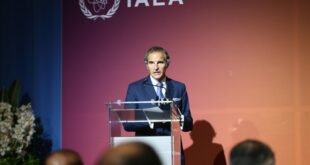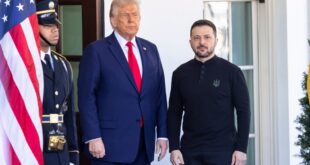Shehab Al Makahleh
America is in relative decline, but this is not attributed to the rise of China, India, Brazil and Russia, but to internal US political, economic and even cultural deterioration.
As known through history, the decline of a great power does not necessarily lead to its demise unless there is a force or other forces collectively working to ending one civilisation and starting another.
The world is undergoing major shifts in the balance of power due to the rise of the three major Euro-Asian powers (China, India and Russia) together for the first time in history, but it is also true that none is individually capable of defeating the American leadership of the world at current stage without setting up a strong alliance.
This is why China, Russia and the US are now approaching Indian government by signing many economic and military agreements to ensure that India stays either neutral or join any of the two blocs: Western led by the Americans and Eastern led by Chinese and Russians.
Reasons for change
India’s interest in following up the rapid developments in regional crises in the Middle East is due to several considerations: First, the increasing involvement of a number of international forces in those calamities, such as Russia and China, which also sought to raise the level of economic relations with the countries of the region through major economic and investment deals in various fields and military agreements in defence cooperation in tandem with American bids to copy Chinese and Russian deals in the Middle East and India to be able to corner China, Russia, India and even Mideast states.
The reasons for India’s interest in Russia’s military has stemmed from Moscow’s involvement in the Syrian crisis, the high level of cooperation between Russia and Iran after the nuclear agreement reached on 14 July 2015, and the regional tour by Chinese President Xi Jinping to Saudi Arabia, Egypt and Iran in January 2016, which aimed to deepen economic relations with the three countries.
The world is undergoing major shifts in the balance of power due to the rise of the three major Euro-Asian powers (China, India and Russia) together for the first time in history
Shehab Al-Makahleh
The other reasons hinge on the likelihood of increased terrorist operations in India along the lines of the Bombay operation in 2008 and recent threats to India. Several reports indicate that India has dismantled a terrorist cell that was planning terrorist attacks.
The city of Mumbai was attacked by insurgents in January 2016, which was an important indicator that India is no longer immune from operations. Thus, countering terrorism is one of the areas of cooperation between India, China, Russia and the USA as millions of Indians work in the Middle East, and they can be easily recruited.
It seems that security cooperation was one of the main axes of Indian Prime Minister Narendra Modi’s visit to Pakistan on Dec. 25, 2015, the first Indian prime minister to visit Pakistan since the Mumbai attacks in 2008. Moreover, India was one of the forces that sought to support peace efforts in Afghanistan.
The other motives are that India tends to increase the level of trade cooperation with international powers and Middle Eastern states, which are considered a major market for Indian products.
The US, with sanctions on Iran, has tried to convince India through high-level economic and military cooperation to cease oil imports from Iran as New Delhi purchases about 80 of its crude oil needs from the Middle East, mainly from Tehran which is strategically closer to India than Arab states.
New Delhi also takes into account the increasing number of Indian workers in the Gulf countries, which are a major source of remittances to the country’s economy. India attempts to compete with Pakistan to establish strong relations with the states of the region and to draw support from some regional powers for its position on the Kashmir issue.
This is evident in India’s relentless efforts to strengthen its relations with Iran, especially on the economic front. India has begun to accelerate the work in the port of Chabahar, which will be the gateway to resource-rich Central Asia and Afghanistan. The port is located in southeastern Iran, a vital point for India’s quest to overtake Pakistan.
On May 22, 2016, a tripartite agreement was signed between India, Iran and Afghanistan to develop the port. India is developing closer security ties and economic interests with Iranians as the port, which India is co-financing, is another gateway for Iran itself to trade not only with India but also with China and Far East.
Vying for New Delhi
Russian President Vladimir Putin has worked to restore the glories of the Russian Empire through several pragmatic stratagems based on the tenets of the most important policies: not to engage in confrontation with the United States, to enhance Russian economy which is primarily based on its huge gas and oil reserves, to pursue a multi-polar world and to form alliances with China and India. The Americans have recently realized that to win over China they have to neutralize Russia and India.
American politicians are working hard to win India or neutralise its government as they seek to do the same with Russia to ensure that their next confrontation would only be with one enemy: China.
The traits of success would be very difficult as each international country has its own considerations and future calculations.
First published at Al Arabiya
https://bit.ly/2Oicghg
 Geostrategic Media Political Commentary, Analysis, Security, Defense
Geostrategic Media Political Commentary, Analysis, Security, Defense





